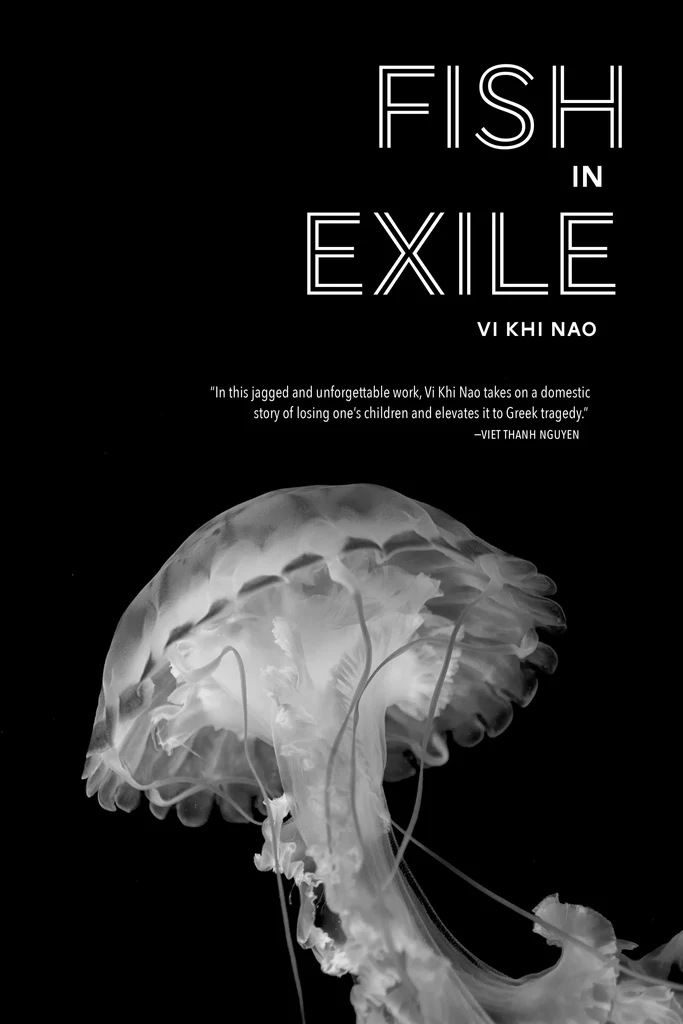This month I’m inspired to write about David Naimon’s Between the Covers interview with Vi Khi Nao. Usually I listen to these interviews without having read the books discussed but, recently, I’ve been relistening to a few, to see if aspects of the conversation resonate differently with more familiarity with the author’s work.
With Vi Khi Nao, neither of the works at the heart of this interview—Umbilical Hospital (poems) and A Brief Alphabet of Torture (short stories)—were available via the public library, but I was able to find Fish in Exile. Although I had previously enjoyed the interview (his series is one of my favourites), reading did add another layer of appreciation.
In the context of her work, she talks about how people should view her story collection as an older sister to Fish in Exile. But Fish was unique, too, in the sense that it was written while she was in an abusive relationship, with some aspects of the narrative omitted in early stage; her lover had been reading the manuscript in progress, so the sections that were not encoded were added after the relationship had ended.
How it’s written does matter, she says: “The concept is boring but the actual art of writing is not.” And she issues a kind of warning to readers, that something deep and introspective is afoot; you have to drop out of reality to engage with the book.
Some of the interview is very serious, as when Naimon comments on a sense of rumination and repetition—which can sometimes be incantatory, and which can deepen engagement. (This word, incantatory, I love it.) But there’s another layer to the interview, as with the talk of sheeps’ assholes and how they blend in with the landscape.
There’s discussion of how Lydia Davis was inspired by cows and how one of her books came out of that. (I wonder how many of Naimon’s interviews don’t include a reference to Davis.) But these sheep that Vi Khi Nao is writing about? They actually exist in film.
She was writing those poems, inspired by the sheep, in 10-minute chunks of time, without editing until the entire chapbook was drafted. She describes this kind of writing as feeling like she was breathing for the first time in her life, like it was sacred.
And, generally, she does not edit her own poems or stories. But Fish was edited, however; twice before landing with Coffee House Press and then a third time, with about 95% of the suggestions accepted by the author.
When she does edit her own work, she is dramatic and creates a wholly different work so that the first version is barely (if at all) recognizable. “It’s not for everyone,” she giggles, “the hammer method versus the tweezer.”
There’s talk about significant influences (C.D. Wright, a poet and teacher at Brown, and Forrest Gander) and she mentions how they affect/ed her energy, in the moment of contact and in a lingering kind of way (for instance, she still feels C.D. Wright’s consciousness with her, even now, although she died in 2016).
When asked why she doesn’t write like Nam Le (The Boat) or Viet Thanh Nguyen (The Sympathizer), she says that writing in English gives her the opportunity for distance. Vietnamese is a beautiful and poetic language, she observes: tender and, she believes, evident in her writing but invisible.
There are some sentences, she notes, which one might feel are ‘strange’ and she thinks these are revealing a slant that exists first in Vietnamese, an expression of her somatic Vietnamese self. It’s playing out like a phantom, she says, like a sonic volume. So even if you don’t see diacritical marks in her language, they take place in the works’ experimental form.
She calls herself an eco-writer because she recycles things that she’s written previously, includes them in a later assignment. And she has different writing rituals, some of which developed out of individual assignments or calls.
She’d started out writing what she imagined to be a more accessible story, the kind she imagined her family would be able to read and appreciate, but the first page that emerged was Fish in Exile. She read Harlequins to try to grasp a more mainstream style, but it just didn’t work—after only one page, she realized it wasn’t going to be a mainstream story.
This interview series: a tremendous resource for literary writers and poets.


Apart from Nam Le, who I count as Australian (and whose short story I didn’t particularly like) my one Vietnamese book is The Sorrow of War by Bao Ninh, one of the great (anti) war books. Though it seems the version I read was translated from a translation, so the writing, as distinct from the story, was a two degrees removed from Bao Ninh’s.
On a different topic altogether I walked behind a lot of sheep as a boy and a young man without ever finding sheep’s arses poetic!
Then perhaps this is the book for you, to reveal unappreciated sheep-ness.
I was just reading an interview with Viet Thanh Nguyen (I wonder what you’d think of The Sympathizer) and he talks about growing up reading a series of boys’ adventure stories, as well as war stories by C.B. Colby, which reminds me a little of the series you’ve described. As for the war, he recommends Larry Heinemann’s Close Quarters, and Paco’s Story. More dark, more critical-he says-than the works of literature more commonly taught and triumphed: Tim O’Brien’s The Things They Carried (which I have read) and Michael Herr’s Dispatches (which I haven’t). I’ll go looking for The Sorrows of War.